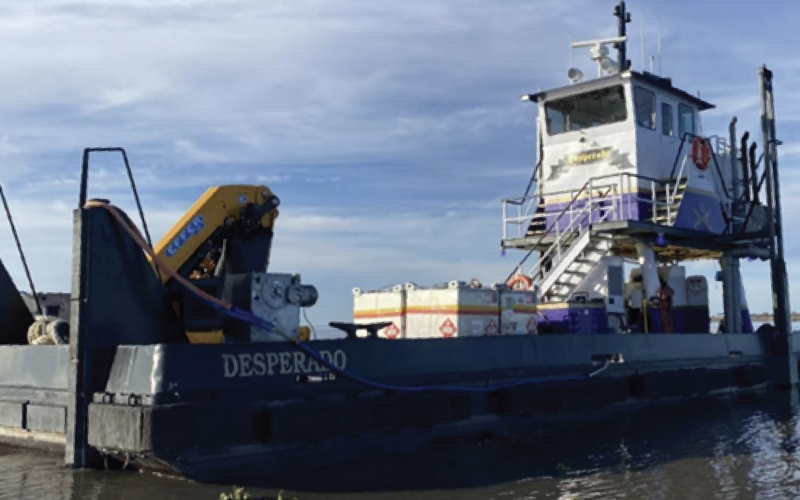A ruptured hydraulic hose spraying fuel on a hot engine led to a fire aboard a towing vessel on Louisiana’s Lake Salvador in February 2023, but the crew’s rapid reaction limited damage, the National Transportation Safety Board said in a new report.
The 59’ lugger tug Desperado was transiting near Bayou Perot, La., on Feb. 17, 2023, en route to the Bayou Couba Oil Field Canal in St. Charles Parish to offload cargo to a rig and perform barge tendering.
After offloading equipment at a rig, the crew was called by dispatch to return to the Tidewater Dock in Larose to pick up additional equipment for the rig. On the way back to the dock, the fire broke out at 1:32 p.m. The captain and two crew members were unable to control the fire with portable extinguishers, according to an NTSB narrative.
The captain found “a ruptured hydraulic line on the portside steering pump directional manifold valve, which subsequently caused flammable hydraulic fluid to disperse onto the port main propulsion engine exhaust manifold and turbocharger and ignite,” the report notes.
Six gallons of hydraulic oil were lost from the steering gear system and consumed by the fire, with $30,000 damage in all and no pollution reported.
NTSB investigators concluded the crew’s prompt actions to remove the fuel and oxygen sources for the fire helped limit the fire damage and extinguish the fire. No pollution or injuries were reported and damage to the vessel totaled $30,000.
“After purchasing the Desperado in August 2022, the captain and two deckhands performed a 4-month overhaul of the vessel to prepare it for service,” the report notes.
“They painted the hull and exterior house, upgraded navigation and electronics in the wheelhouse, and performed recommended maintenance on the main propulsion engines and auxiliary equipment. The captain performed several maintenance items and trained the two deckhands along the way. The captain told investigators that he hired technicians to perform complex tasks.”
On Sept. 30, 2023, the captain obtained an estimate from a local vendor for an “air control and steering installation,” to ensure the systems were working properly. After the technicians completed their work about one month later, “there were no reported issues by the captain or deckhands, other than a few minor hydraulic leaks that required tightening of fittings or connections,” according to the report.
The hose that ruptured was manufactured in October 2018. “It is unlikely that the older hose was installed during the 2022 refurbishment,” the report notes. However, “after reviewing photographs of the area where the fire occurred and where the replacement hydraulic hose was installed, investigators identified issues with how the hose had been installed. Contrary to manufacturer guidance, the hose appeared to exceed the bend radius; it was not guided with clamps, fittings, or adapters; and it did not have any protective cover. The manufacturer guidance warned that an improperly installed hose could fail.”
“Bending or flexing a hose to a radius smaller than the minimum recommended, or subjecting a hose to tension or torque, can place excessive stress on the hose and severely reduce the ability of the hose to withstand pressure,” the investigators wrote. “Actions to avoid hose damage or failure include clamping a hose in place to provide support, rerouting a hose assembly by installing fittings and adapters, and using a hose with more reinforcement.”





